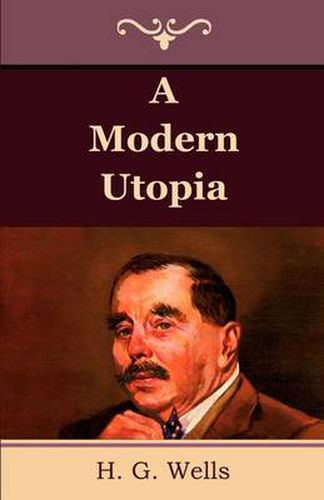Readings Newsletter
Become a Readings Member to make your shopping experience even easier.
Sign in or sign up for free!
You’re not far away from qualifying for FREE standard shipping within Australia
You’ve qualified for FREE standard shipping within Australia
The cart is loading…






This title is printed to order. This book may have been self-published. If so, we cannot guarantee the quality of the content. In the main most books will have gone through the editing process however some may not. We therefore suggest that you be aware of this before ordering this book. If in doubt check either the author or publisher’s details as we are unable to accept any returns unless they are faulty. Please contact us if you have any questions.
A Modern Utopia (1905) is a work of fiction by H. G. Wells. H. G. Wells’s proposal for social reform was the formation of a world state, a concept that increasingly occupied him throughout the remainder of his life. One of his earliest and most ambitious attempts at portraying a world state was A Modern Utopia (1905) (McLean). Like most utopians, he indicated a series of modifications which in his opinion would increase the aggregate of human happiness. Basically, Wells’ idea of a perfect world would be if everyone were able to live a happy life. This book is written with an intimate knowledge of former ideal commonwealths and is a conscious attempt to describe a utopia that is not utopian. June Deery refers to A Modern Utopia as a work in progress for two obvious reasons: 1) It is about social and technological advance, and 2) Wells stresses that he is describing a dynamic utopia. This means that this modern society requires and allows further improvement. The work was partly inspired by a trip to the Alps Wells made with his friend Graham Wallis, a prominent member of the Fabian Society. A Modern Utopia was intended as a hybrid between fiction and ‘philosophical discussion’. Wells began by stating that the people of this utopia have to plan a flexible common compromise, in which a perpetually novel succession of individualities may converge most effectually upon a comprehensive onward development. That is the first, most generalised difference between a Utopia based upon modern conceptions and all the other Utopian stories that were written previously (Wells, Ch. 1). An important fact about this modern Utopia is that the people’s purpose is to be Utopian. Also, the modern Utopia must have people inherently the same as those in the rest of the world. (wikipedia.org)
$9.00 standard shipping within Australia
FREE standard shipping within Australia for orders over $100.00
Express & International shipping calculated at checkout
This title is printed to order. This book may have been self-published. If so, we cannot guarantee the quality of the content. In the main most books will have gone through the editing process however some may not. We therefore suggest that you be aware of this before ordering this book. If in doubt check either the author or publisher’s details as we are unable to accept any returns unless they are faulty. Please contact us if you have any questions.
A Modern Utopia (1905) is a work of fiction by H. G. Wells. H. G. Wells’s proposal for social reform was the formation of a world state, a concept that increasingly occupied him throughout the remainder of his life. One of his earliest and most ambitious attempts at portraying a world state was A Modern Utopia (1905) (McLean). Like most utopians, he indicated a series of modifications which in his opinion would increase the aggregate of human happiness. Basically, Wells’ idea of a perfect world would be if everyone were able to live a happy life. This book is written with an intimate knowledge of former ideal commonwealths and is a conscious attempt to describe a utopia that is not utopian. June Deery refers to A Modern Utopia as a work in progress for two obvious reasons: 1) It is about social and technological advance, and 2) Wells stresses that he is describing a dynamic utopia. This means that this modern society requires and allows further improvement. The work was partly inspired by a trip to the Alps Wells made with his friend Graham Wallis, a prominent member of the Fabian Society. A Modern Utopia was intended as a hybrid between fiction and ‘philosophical discussion’. Wells began by stating that the people of this utopia have to plan a flexible common compromise, in which a perpetually novel succession of individualities may converge most effectually upon a comprehensive onward development. That is the first, most generalised difference between a Utopia based upon modern conceptions and all the other Utopian stories that were written previously (Wells, Ch. 1). An important fact about this modern Utopia is that the people’s purpose is to be Utopian. Also, the modern Utopia must have people inherently the same as those in the rest of the world. (wikipedia.org)